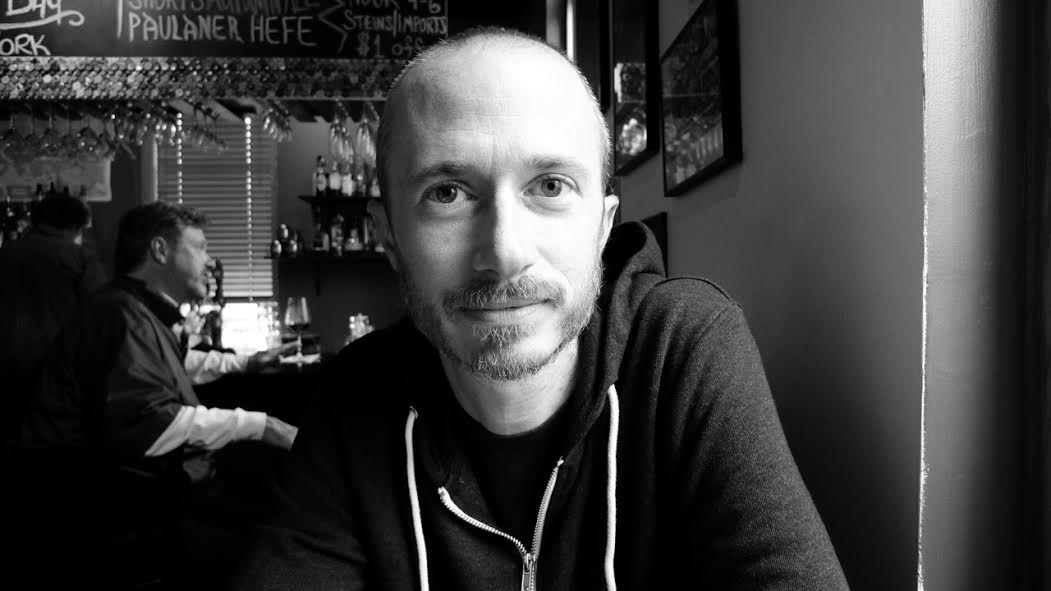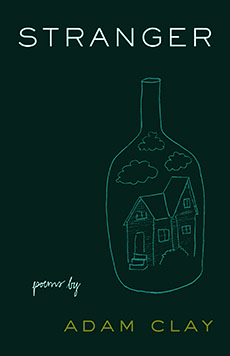Interview: Adam Clay
 Midwestern Gothic staffer Allison Reck talked with poet Adam Clay about his collection Stranger, the lived moment, writing as a conversation, and more.
Midwestern Gothic staffer Allison Reck talked with poet Adam Clay about his collection Stranger, the lived moment, writing as a conversation, and more.
**
Allison Reck: What’s your connection to the Midwest?
Adam Clay: I’m a transplant to the area — I grew up in Mississippi but ended up in Michigan for graduate work. It wasn’t a part of the country I ever imagined myself living in, to be honest, but I felt at home there in Southwest Michigan. Afterwards, I moved to Kentucky for a few years, but now I’m in Springfield, Illinois. My wife and I bought a cabin in upper Michigan a few years back, too, so we still lay some claim to being Michiganders, too.
AR: Your newest collection of poems, Stranger, focuses on a very relatable element of the human experience: transition. In what way do you feel Stranger is a reflection of your own understanding of change?
AC: That’s a great question. I don’t know if one really can understand the role of change or transitions in a succinct way, especially in the moment — each change has a life of its own. I do think, though, that the poems in this book ended up with an approach to thinking about change: and that is to accept it. The poems focus on daily moments as a way of emphasizing the path a day can take — eventually a major transition becomes routine until another transitions shuffles things around. The metaphor of a river running toward the sea might be a good way to think about it. Disruptions occur, oxbows are left behind, but eventually water finds a way to the place it’s meant to reach.

AR: Your poetry treats the past, present, and future and how they relate to the “lived moment”. How and why does time play an important role in your writing?
AC: As I thought about change and transition through the structuring and ordering of the book, I saw a lot of the poems dealing with time (or attempting to consider time) in a variety of ways. Because time can ultimately affect how we view transitions, it seemed like an important feature of the book. One of the challenges I faced in writing the book was trying to consider abstract notions through concrete language. Poetry seems like the genre to do this: it allows figurative language to understand what can’t be seen or what might even be arbitrary, ultimately.
AR: Stranger is your third collection of poems thus far – what draws you to poetry as a means of expression rather than other art forms?
AC: It’s always felt like the most comfortable form for me, though I’m not sure if I can put my finger on why that’s the case. I’ve always been interested in the way a poet balances music and meaning (or content and form) in exploring a particular theme or idea — sometimes the music directs the content and sometimes it’s the other way around.
AR: Some of the advanced praise for Stranger has noted that you “[refuse] to placate or console [your] reader.” What does this mean, in your interpretation of the quote?
AC: I can remember Cate Marvin writing me after reading my book and telling me how dark she found it to be (at least in places). I think there can be a temptation that poets face to provide context or commentary for a particular moment or observation — this might be especially true for a moment that’s particular dark or troubling. I think the quote might suggest that there are moments in the book where these troubling points are left standing on their own without follow-up or context. Life isn’t always neat in terms of how we engage with our experiences — perhaps a refusal to placate simply falls in line with how we engage with life on a daily basis, including both the big transitions and the small, quotidian moments.
AR: You have been hailed as “one of the best young American poets writing today.” Where do you find inspiration for your writing?
AC: I tend to find inspiration or motivation from other writers. I often write with a book open next to me — it seems easier to think about writing as a conversation rather than a monologue. I try to jot down ideas or images, too, as I encounter them. I might not know how they’ll fit into the picture of whatever the current project might be, but I find that’s part of the joy of writing: knowing something needs to be included in some way but not knowing how exactly it’ll fit in.
AR: How do you feel that your writing has evolved with each new publication? For example, has the environment you write in changed, the draft process, or even your writing style itself?
AC: All three of my books are different in some way — it’s the result of some conscious choices, but other factors play a role as well. With Stranger there was a definite shift to the “I” of the poems as being autobiographical. In terms of process, I shifted towards drafting a large number of poems and cutting back to the collection — this was different from the previous two books where I wrote towards the book as a completed object. Having a large number of poems to work from was particularly satisfying — I felt comfortable cutting when it seemed fit.
AR: How does the title, Stranger, relate to important elements such as time, change, and “the way forward?” Do you feel there is a particular link between these subjects and feelings of alienation?
AC: Because the book is so much about the birth of my child, the title seemed apt. Transitions or change impact the world — or perhaps simply the way we view it —in massive ways. Eventually, of course, the strange becomes routine, of course, and the book eventually settles on this point as a way of accepting change before moving on.
AR: What’s next for you?
AC: I just finished up a manuscript the other day so I’m not really sure what’s next. I tend to take a break from writing in the summer and read a bit. I’ll get back to writing in the fall, I’m sure. I’ve been toying with the idea of trying prose, perhaps creative nonfiction. Poetry will always be my primary genre, but I’m intrigued to see what a new form might lead me to as I consider some of the same themes that Stranger seeks to grapple with and understand.
**
Adam Clay is the author of Stranger (Milkweed Editions, 2016), A Hotel Lobby at the Edge of the World (Milkweed Editions, 2012), and The Wash (Parlor Press, 2006). His poems have appeared in Ploughshares, Crab Orchard Review, Boston Review, Iowa Review, The Pinch, and elsewhere. A co-editor of TYPO Magazine, he serves as a Book Review Editor for Kenyon Review and teaches at the University of Illinois Springfield.






